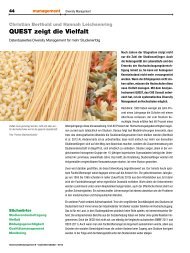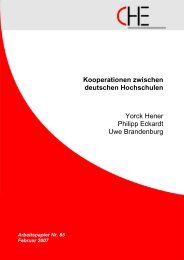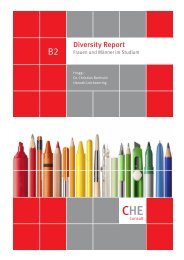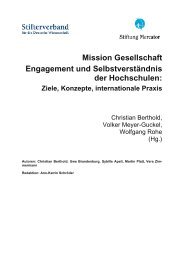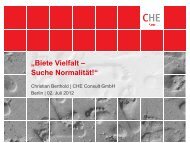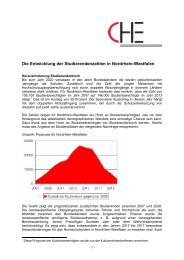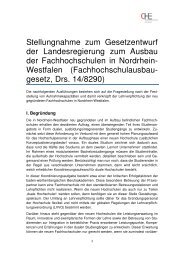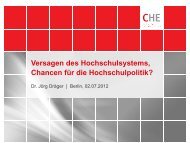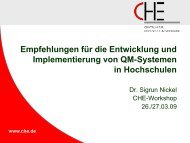Considerations in regards to the survey tool memo - CHE Consult
Considerations in regards to the survey tool memo - CHE Consult
Considerations in regards to the survey tool memo - CHE Consult
You also want an ePaper? Increase the reach of your titles
YUMPU automatically turns print PDFs into web optimized ePapers that Google loves.
Moni<strong>to</strong>r<strong>in</strong>g Exchange Mobility Outcomes<br />
3. Bibliography<br />
Beck, U. (1997). Was ist Globalisierung. Frankfurt/M.<br />
Berthold, C., Leichsenr<strong>in</strong>g, H. (Eds.) (2012). Diversity<br />
Report. Gütersloh.<br />
Bird, A., Osland, J. (2004). Global competencies: An<br />
<strong>in</strong>troduction. In H. Lane, M. Maznevski, M. Mendenhal,<br />
J. McNett, Handbook of global management. Oxford:<br />
Blackwell. p. 57-80<br />
Black, J., Mendenhall, M., Oddou, G. (1991). Toward<br />
a comprehensive model of <strong>in</strong>ternational adjustment:<br />
An <strong>in</strong>tegration of multiple <strong>the</strong>oretical perspectives.<br />
Academy of Management Review, 16(2), 291-317.<br />
Bolten, J. (2007). Interkulturelle Kompetenz. Erfurt:<br />
Landeszentrale für politische Bildung.<br />
Bolten, J. (2007). Was heißt „Interkulturelle Kompetenz“?<br />
Perspektiven für die <strong>in</strong>ternationale Personalentwicklung.<br />
In V. K. Bern<strong>in</strong>ghausen (Hrsg.), Wirtschaft<br />
als <strong>in</strong>terkulturelle Herausforderung. Frankfurt<br />
a. Ma<strong>in</strong>. p. 21-42<br />
Borkenau, P., Ostendorf, F. (2008). NEO-Fünf-Fak<strong>to</strong>ren<br />
Inventar nach Costa und McCrae (NEO-FFI). Manual<br />
(2nd ed.). Gött<strong>in</strong>gen: Hogrefe.<br />
Brandenburg, U., de Wit, H. (2011). The End of Internationalization.<br />
International Higher Education, 62,<br />
p. 15-17.<br />
Chen, G. (1987). Dimensions of <strong>in</strong>tercultural communication<br />
competence. Ohio: Kent State University.<br />
Costa, P., McCrae, R. (1989). NEO PI/FFI manual supplement<br />
for use with <strong>the</strong> NEO Personality Inven<strong>to</strong>ry<br />
and <strong>the</strong> NEO Five-Fac<strong>to</strong>r Inven<strong>to</strong>ry. Odessa, Fl.: Psychological<br />
Assessment Resources.<br />
Costa, P., McCrae, R. (1992). Revised NEO Personality<br />
Inven<strong>to</strong>ry (NEO PI-R) and NEO Five Fac<strong>to</strong>r Inven<strong>to</strong>ry<br />
(NEO-FFI). Professional manual. Odessa, Fl.: Psychological<br />
Assessment Resources.<br />
Cui, G., Awa, N. (1992). Measur<strong>in</strong>g <strong>in</strong>tercultural effectiveness:<br />
An <strong>in</strong>tegrative approach. International Journal<br />
of Intercultural Relations, 16(3), 311–326.<br />
www.<strong>memo</strong>-<strong>to</strong>ol.net<br />
Cui, G., Van den Berg, S. (1991). Test<strong>in</strong>g <strong>the</strong> construct<br />
validity of <strong>in</strong>tercultural effectiveness. International<br />
Journal of Intercultural Relations, 15, 227-241.<br />
de Wit, H. (2011). GLOBAL: Nam<strong>in</strong>g <strong>in</strong>ternationalization<br />
will not revive it. Download 14.03.2012 from<br />
http://www.universityworldnews.com/article.<br />
php?s<strong>to</strong>ry=20111021215849411<br />
Deci, E. L., Ryan, R. M. (1985). Intr<strong>in</strong>sic motivation<br />
and self-determ<strong>in</strong>ation <strong>in</strong> human behavior. New York:<br />
Plenum.<br />
D<strong>in</strong>ges, N., Baldw<strong>in</strong>, K. (1996). Intercultural competence:<br />
A research perspective. In D. Landis, R. Bhagat,<br />
Handbook of <strong>in</strong>tercultural tra<strong>in</strong><strong>in</strong>g. Thousand<br />
Oaks, CA: Sage Publications. p. 106-123<br />
Dyal, J. (1984). Cross-cultural research with <strong>the</strong> locus<br />
of control construct. In H. Lefcourt, Research with<br />
<strong>the</strong> locus of control construct. San Diego: Academic<br />
Press. p. 209-306<br />
Hammer, M. (1987). Behavioral dimensions of <strong>in</strong>tercultural<br />
effectiveness. International Journal of Intercultural<br />
Relations, 11, p. 65-88.<br />
Hammer, M., Gudykunst, W., Wiseman, R. (1978). Dimensions<br />
of <strong>in</strong>tercultural effectiveness: An explora<strong>to</strong>ry<br />
study. International Journal of Intercultural Relations,<br />
2, p. 382-393.<br />
Hofstede, G. (2001). Culture‘s Consequences – Compar<strong>in</strong>g<br />
Values, Behaviors, Institutions and Organizations<br />
Across Nations (2. Ausg.). London, Neu Delhi:<br />
Thousand Oaks.<br />
Hofstede, G. (2009). Lokales Denken, globales Handeln<br />
(4th ed.). DTV Deutscher Taschenbuch Verlag.<br />
Hudzik, J. K. (2011). Comprehensive Internationalization.<br />
From Concept <strong>to</strong> Action. Download 14.03.2012<br />
from http://www.nafsa.org/uploadedFiles/NAFSA_<br />
Home/Resource_Library_Assets/Publications_Library/2011_Comprehen_Internationalization.pdf<br />
Hull, W. (1978). Foreign students <strong>in</strong> <strong>the</strong> United States<br />
of America: Cop<strong>in</strong>g behavior with<strong>in</strong> <strong>the</strong> educational<br />
environment. New York: Praeger.<br />
Kl<strong>in</strong>eberg, O., Hull, W. (1979). At a foreign university:<br />
An <strong>in</strong>ternational study of adaptation and cop<strong>in</strong>g. New<br />
York: Praeger.<br />
8



